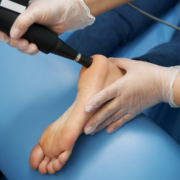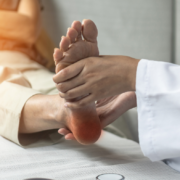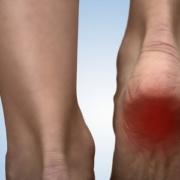Shockingly Effective: Non-Invasive RSWT Nixes Nasty Heel Pain
Heel pain can derail your day, and unfortunately, it can also be a stubbornly persistent problem. Typically caused by weakened or strained plantar fascia, untreated heel pain can spiral into further complications and become intensely painful.
At Carrollton Foot Center, many of our patients have active lifestyles, so they’re eager to return to their normal daily activities. And because we utilize the latest in advanced medical technology, we often recommend RSWT, or Radial Pulse Shockwave Therapy, to help repair your heels and get your routine back to normal.
This post is devoted to explaining the ins and outs of RSWT, covering what it can treat, how it works, and why it might just be the perfect choice for your aching heels!
What is RSWT?
Radial Pulse Shockwave Therapy may be sophisticated technology, but in some ways it’s simple:
- This FDA-approved method has been shown to speed up the rate of recovery for soft tissue tendinopathy and related conditions.
- Of all the non-invasive, conservative treatments available, it is the most advanced.
- It uses sound waves to trigger your body’s natural healing response.
What Can It Treat?
RSWT can be a great option for treating a variety of issues, but most of them pertain directly to soft tissue dysfunction or similar problems, such as:
- Neuromas
- Diabetic wounds
- Plantar Fasciitis
- Achilles Tendinitis
How Does it Work?
Chronic pain can trick your response systems; if it endures long enough, it will cause your body to stop recognizing that there is an injury in the afflicted region. Once this occurs, the healing process is halted, but the pain will remain. That’s when RSWT really comes in handy:
- Ballistic sound waves penetrate deeply into the soft tissue and cause a minor inflammatory issue in the chosen area.
- The soundwaves and inflammation reactivate your body’s natural healing process.
- Additionally, energy emissions cause the cells in surrounding tissue to exude biochemical substances that empower your boy’s healing capabilities.
- Said biochemical substances enable the construction of new blood vessels and soft tissue as needed.
When it comes to innovation, Dr. Naghmeh Lilly Khavari is always raising the bar in Carrollton, TX. She offers a variety of treatments, from conservative interventions to advanced surgical solutions. Contact our office at 469-998-3668 to schedule an appointment today!





